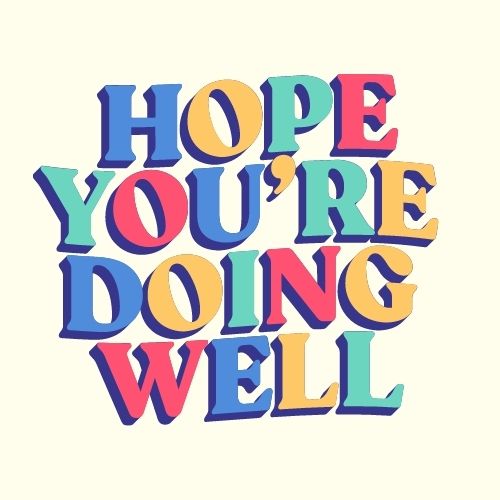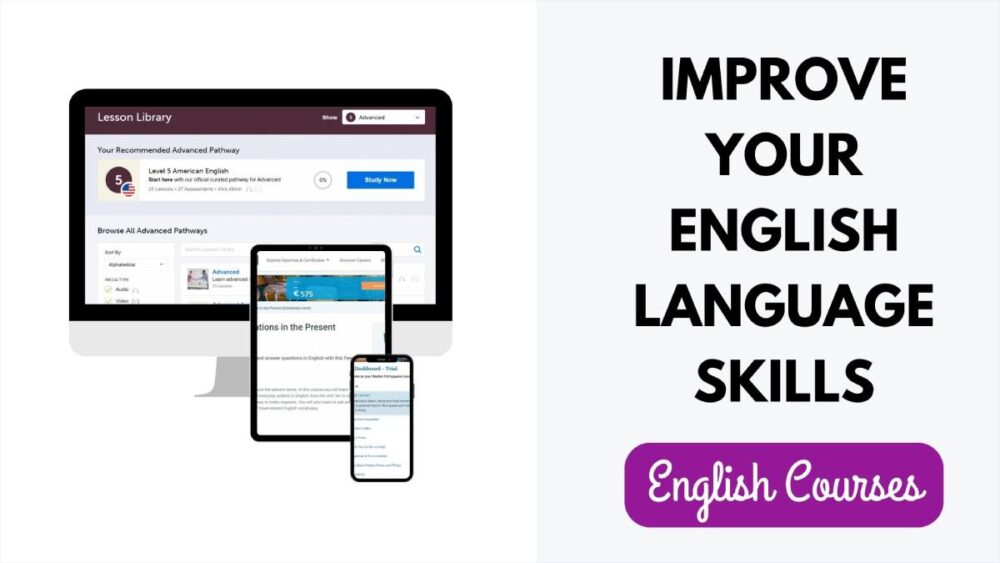Disclosure: This article may contain affiliate links, meaning that when you make a purchase, I earn a small commission. Affiliate links cost you nothing to use and help keep my content free. For more info, see the Disclosure Policy.
If you have ever heard of the expression “I hope all is well with you,” you might be wondering what it means and how to respond.
Below we give the best examples of how to respond to “hope all is well” while providing alternative ways you can say this expression in your conversations and emails.
Struggling to understand and communicate with native English speakers? Innovative Language provides short lessons for fast and effective learning. Get personalized guidance from a teacher and complete it at your own pace.
What does “I hope all is well with you” mean?
In general, the person saying the phrase ” I hope all is well with you” may be asking how someone feels, if they are happy, what they have been up to lately, etc.
This is known as a phatic expression, or small talk, whose social function is to establish and maintain social bonds with people. It is said out of politeness and as a pleasantry, similar to “hello, how are you.”
The person who says “I hope all is well with you” is saying that they hope that you are feeling good physically and mentally, and they want you to be complete, healthy, and happy.
This expression can be said in both formal and informal situations. It is sometimes used in emails.
How to Reply To “Hope All is Well With You” in an Email
Let’s talk about how you can reply to “hope all is well with you,” whether it’s an email or in-person.
There are various ways we can respond to “I hope all is well with you.
Your response would depend on the depth of your relationship with the other person.
We may not need to answer this if it is a closed statement (without the question mark). The statement could be said to start the conversation, like a conversation filler, a greeting, or a pleasantry that doesn’t necessarily require a response.
It could also be a substitute for the question, “How are you doing?” In any case, they are asking about your well-being. You usually provide a quick update and let them know that you’re doing well.
If we don’t know the person very well, we usually just respond generically, saying that we are fine or good.
If we know the person, we might feel like going into a deeper conversation about how we are feeling, what we are doing lately or what is happening in our lives.
In some cases, it might be referring to something specific. For example, maybe your relative died, and it’s their way of checking in to make sure you are okay, so you can be more honest about how you are and reply with ‘thanks for your concern.’
If you initiated the conversation with a greeting like “hey” or “happy holidays,” and they respond with “hope all is well with you,” it’s a way of returning the gesture to be polite. It might be a closing statement and not necessarily a cue to keep the conversation going.
If the person initiates the conversation with “I hope all is well with you,” it’s usually a good idea to reciprocate by returning the greeting with one of the following replies:
Informal Replies
If you have a good relationship with the person or have met them on a number of occasions and feel comfortable with them, you can reply informally.
You might want to go deeper into a conversation about what’s happening in your life and how you feel.
Ways to Respond to “Hope You Are Well” Informally
- “Thanks.”
- “And you as well.”
- “I’m fine, thanks/ thank you.”
- “Everything’s fine, thanks.”
- “I’m doing well. How are you?”
- “Hope you’re doing okay as well!”
- “Thanks! Hope you’re doing well, too.
- “I am very well, thanks. How are you?”
- “I am doing fine. Thank you for asking. “
- “I wish I was, but better days are ahead.”
- Thanks. I hope things are also going well for you.”
- “I am very well, thanks, and I hope you are as well.”
- “Thanks, I hope the same with you. How are you?”
- “Thanks, I’m fine. I hope all is well with you too.”
- “I hope all is well with you too, thank you for asking!”
- “I’m good, thanks. I hope all is well with you too.”
- “Well, thank you for asking. I am alright, thanks…and you?”
- “I am very well, thanks. I hope it’s the same with you too.”
- “As well as can be expected in these unprecedented times.”
- “I’m doing okay, and I hope you’re good, too. What’ve you been up to lately?”
- “My life is a MESS. The shower is clogged. My husband won’t get up and help around the house. The kids are spending too much time on their phones. I don’t have any time for myself. I need a holiday!” (Maybe too much detail!!!)
Formal Replies
If you are talking to your boss, someone in authority or someone you don’t know very well, you can respond in a formal fashion.
Here we don’t go into too much detail about how we are doing and what’s going on in our lives. We keep it short, simple and polite.
Ways to Respond To “Hope You Are Well” Formally
- “Thank you.”
- “I’m fine, thank you.”
- “Everything is fine, thank you.”
- “I am doing fine. Thank you for asking. “
- I hope all is well with you too, thank you for asking!
- “Thank you. I hope things are also going well for you.”
- “I am very well, thank you, and hope you are as well.”
- “Thank you, I’m fine, and I hope all is well with you too.”
- “Thank you for wishing me well. Hope you’re doing well, too.
- “I am very well, thank you. I hope it is the same with you too.”

Alternative Ways to Say “I Hope All is Well”
Alternative ways to start a conversation or email (formal and informal):
- “I hope this email finds you well.”
- “I hope all is well in your world.”
- “I hope this mail finds you in good health and spirits.”
- “I hope you are doing well!”
- “I hope you’re having a great (week, day).”
- “I hope you have a two-coffee (versus a four-coffee) day.”
- “What’s the latest in your world?”
- Have you made any plans for the weekend?
- “Are you excited for (upcoming event)?”
- “I hope you enjoyed (industry event).”
- “I hope everything’s going well at (company name)?”
- “Dear friend, I’m hoping you’re keeping your chin up. Sending you my best wishes!
- “How are you dealing with the (summer heat, winter cold, this weather)?”
- “I hope (last page seen) was useful.”
- “Is there anything worse than coming back from a long weekend?”
- Excellent (blog post, LinkedIn comment, podcast episode, interview) – I learned (fact)
- “Where have you been traveling lately?”
- “How’s life in (office location)?”
- “I’m sure you’ve had a lot better weather in (office location) than we’ve been having in (rep’s region).”
- “I’m reaching out because…”
- “I’m hoping that your X project is (off to a good start, is progressing nicely, and is yielding fantastic results)
- “Have you seen any good programs recently?”
- I wish to express my gratitude for (insert recent experience).
See more: +50 “Hope All is Well” Alternatives

You may also be interested in: 15 Best Online English Courses Free & Paid (2022)
In Conclusion
Thanks for reading! I hope you now have a better idea of how to respond to “hope all is well.”
Sometimes it’s good to be a little formal with an email or conversation, and other times informal is fine.
So use what fits best depending on your relationship with the person and thank them for asking!
Language Pack
6-Day English Challenge
Sign up for my free 6-day challenge + English vocabulary planner to improve your English skills. Practice for just 10 minutes per day and see the results! Sign up here.
One-on-One and Group Classes (Free Trial!)
Language lessons and targeted rapid learning at Lingoda to improve confidence. Classes are available 24/7 in English, Business English, German, French, and Spanish. Get a 7-day trial here.
Learn to READ AND WRITE
Learn how to write the letters of the alphabet and common English words with my printables available here. Improve early reading scores by 74% with the early learning program Homer.
Most Common Words in English
Did you know 3000 words in English make up about 95% of everyday conversation? Learn the 2000 most common words in English completely FREE when you sign up for English Class 101— no credit card required! Also, check out their monthly free gifts selection.
English Language Learning Videos
Study and learn English independently and at your own pace with the successful Building Your English Brain and English Vocabulary Launch: Upgrade your Speaking (intermediate).
Useful Links
- “What Are You Up To” Meaning and Response
- 20 Best Ways to Respond to “How Is Your Day Going”
- “Thank You For Letting Me Know” Email Correction & Synonyms
- “Hope To See You Soon” Meaning and Alternative Phrases
- Different Ways to Say Have a Good Evening
- Best Responses to “Good to Hear From You”
Caitriona Maria is an education writer and founder of TPR Teaching, crafting inspiring pieces that promote the importance of developing new skills. For 7 years, she has been committed to providing students with the best learning opportunities possible, both domestically and abroad. Dedicated to unlocking students' potential, Caitriona has taught English in several countries and continues to explore new cultures through her travels.

